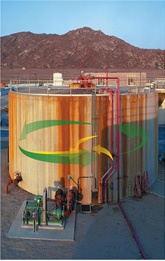Generating energy from a wide range of waste materials by utilising the Anaerobic Digestion (AD) process is well established in the UK to the point where operators are now looking too consolidate their positions and meet the future demands of maintaining and maximising the performance of digesters. Improving efficiencies and reducing costs are the challenges against the backdrop of a tough economic climate, so AD operators need to maximise the sustainability benefits of their plant and equipment which means each part of the AD process is under ever closer scrutiny. However, what constitutes ‘good operation’ for a digester, how can it be measured and what can AD operators do to improve the performance of their digester and be even more competitive?
MINI-DROP MIXING SYSTEM
Cambridgeshire based System Mix Ltd, in conjunction with P&M Pumps have developed the concept of pumped mixing systems within the Vaughan Rotamix dual zone mixing concept (see picture 1) which was introduced in 2003 and incorporates the Vaughan Chopper Pump. Today, numerous AD operators across the UK are appreciating the benefits of their expertise and the company is in an ideal position to provide some answers to the questions posed above.
In simple terms ‘good operation’ can be measured by the quantity of gas produced per volume of feed material, so the calculation would be; the best price for gas produced, multiplied by the volume, less the minimum of material to be processed at the lowest price, equals best profit.

The following list should help operators to focus on the priorities:
- Highest gas production possible.
- plant throughput at its design maximum – or higher.
- Maintained working volume by minimising deposition.
- Stable chemically balanced operation with no foaming problems.
- Low maintenance costs combined with equipment reliability.
System Mix’s experience is that they usually see their customer’s measure of ‘good operation’ is gauged by the quantity of gas being produced. However, running costs should also be taken into account when measuring ‘good operation’. Therefore, it would be beneficial at this point to remind operators of best practice.
For example, after initial system commissioning and following a period of operation, plant operators should evaluate throughput and performance. This should be compared with how the digester performed following commissioning. Markers for this would be temperature profile and volumes being processed which would provide a picture of how much capacity was being lost by solids deposition on the digester floor.
Other important considerations are to evaluate the suitability and efficiency of preconditioning digester feed material, ensuring that the material being fed to the digester is providing optimum digestion performance.
Furthermore, operators need to review the efficiency and reliability of the equipment being used to ensure that the ancillary equipment installed, maintains the best working conditions for the life of the digester. As a result of their extensive experience at numerous sites across the UK, System Mix are well qualified to confirm that utilising the most effective mixing technology is a very significant factor in overall digester performance.
System Mix have completed successful digester mixing projects over the last few years to Veolia, Shanks Waste Management, Fernbrook Bio, BioGen, Imtech, Black and Veatch, in addition to many of the UK’s waste water companies. One recent project is for Thames Water involving System Mix installations at their waste treatment sites at Becton and Crossness in Barking and Dartford. These are important sites where Thames Water has upgraded facilities to enable them to handle the increasing volumes of waste and involve unusual geometry for some of the tanks
The continuous development and understanding of the digestion process and with sludge rheology, plus a wealth of understanding of solids pumping and mixing, provides AD system operators with the confidence that they can install the Rotamix System, without fear of expensive downtime and poor performance.
Furthermore, by providing additional process performance guarantees, backed by CFD analysis (computational fluid dynamics) it is possible to show that over 95% of available working volume can be utilised ensuring that high volatile solids destruction and therefore gas production, is maintained throughout the working life of the digester.
Further information is available from:
Andy Parr Director Sawtry, Huntingdon, UK.
Tel: +44 (0) 1487 830123
Email: andy@pumpmix.co.uk
Website: www.pumpmix.co.uk
